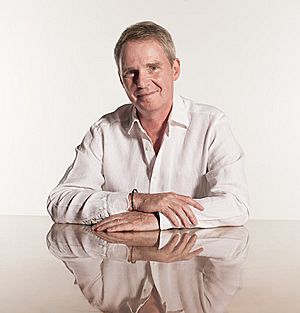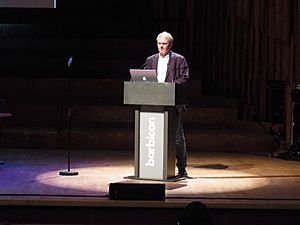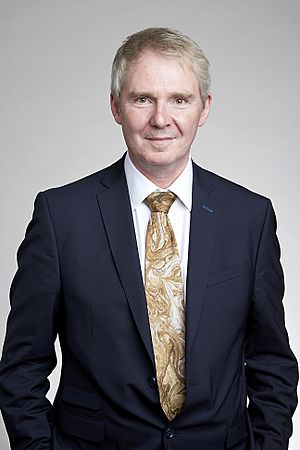Nigel Shadbolt facts for kids
Quick facts for kids
Sir Nigel Shadbolt
|
|
|---|---|

Shadbolt in June 2013
|
|
| Born |
Nigel Richard Shadbolt
9 April 1956 London, England
|
| Education | Lady Manners School |
| Alma mater | |
| Known for |
|
| Spouse(s) |
Beverly Saunders
(m. 1992) |
| Awards | Knight Bachelor (2013) |
| Scientific career | |
| Fields |
|
| Institutions |
|
| Thesis | Constituting Reference in Natural Language: The Problem of Referential Opacity (1986) |
| Doctoral advisor |
|
| Doctoral students |
|
Sir Nigel Richard Shadbolt, born on April 9, 1956, is a very important computer scientist. He is currently the head of Jesus College, Oxford, which is a part of the famous University of Oxford. He is also a professor there.
Sir Nigel is known for his work in Artificial Intelligence (AI). He helped create the Open Data Institute with Tim Berners-Lee, who invented the World Wide Web. He also teaches at the University of Southampton. His research helps us understand how smart behavior works in people, machines, and on the internet. He has contributed to many fields like psychology, computer science, and web science.
Contents
Nigel's Early Life and School
Nigel Shadbolt was born in London, England. He grew up in a small village called Ashford-in-the-Water. He described his childhood there as "bucolic," meaning peaceful and rural.
He went to Lady Manners School. Later, he studied philosophy and psychology at Newcastle University. He then earned his Ph.D. (a very high degree) from the University of Edinburgh. His Ph.D. research looked at how people organize their conversations.
What Kind of Research Does Nigel Do?
Sir Nigel has been working in Artificial Intelligence since the late 1970s. He has explored many different topics. These include how computers understand human language and how robots work. He also studies expert systems, which are computer programs that can make decisions like human experts.
His work also covers how our brains process information and how our memory works. More recently, he has focused on the Semantic Web and linked data. The Semantic Web is about making internet data easier for computers to understand. Linked data connects different pieces of information on the web.
He also writes books about the bigger ideas behind his research. For example, he co-wrote a book called The Spy in the Coffee Machine. This book explores ideas about privacy and trust in the digital world. His newest research is about "social machines." These are like giant problem-solving systems that combine people, computers, and data from the internet.

In 1983, Shadbolt started working at the University of Nottingham. From 2000 to 2015, he was a professor of artificial intelligence at the University of Southampton.
From 2000 to 2007, he led a big research project called Advanced Knowledge Technologies (AKT). This project did a lot of research on the Semantic Web. It looked at how to collect and combine different types of information. It also explored how computers could use meaning (semantics) to suggest content.
In 2006, Sir Nigel became a Fellow of the Royal Academy of Engineering. He is also a Fellow of the British Computer Society (FBCS). He was even the President of the British Computer Society during its 50th anniversary.
That same year, Nigel Shadbolt, Tim Berners-Lee, Wendy Hall, and Daniel Weitzner started the Web Science Research Initiative. This group helps promote Web Science. Web Science is a field that studies the World Wide Web as a whole. It also helps researchers from the University of Southampton and Massachusetts Institute of Technology work together.
From 2007 to 2011, Shadbolt was a deputy head at the University of Southampton. From 2011 to 2014, he led the Web and Internet Science Group. This was the first research group focused on studying Web science and Internet science. It had 140 staff, researchers, and students.
His work on the Semantic Web led to a company called Garlik. This company offered services to protect people's online identity. In 2008, Garlik was recognized as a "Technology Pioneer" by the Davos World Economic Forum. It also won a UK BT Flagship IT Award. Another company, Experian, bought Garlik in November 2011.
In June 2009, he and Tim Berners-Lee became advisors to the UK Government. They led a team to create data.gov.uk. This website is a single place where people can find public data from the UK Government. In May 2010, the UK Government appointed him to the Public Sector Transparency Board. This board sets standards for open data across the government.
In December 2012, Shadbolt and Tim Berners-Lee officially launched the Open Data Institute (ODI). The ODI helps new businesses that want to use open data. It also provides training and promotes standards for open data. In 2013, Sir Nigel and Tim Berners-Lee joined the board of advisors for a tech company called State.com. This company aimed to create a network of structured opinions on the semantic web.
On August 1, 2015, he became the head of Jesus College, Oxford. He also became a research professor in the Department of Computer Science, University of Oxford. He is also a Pro-vice-chancellor at the University of Oxford. He will finish his role at Jesus College in July 2026.
Important Roles and Awards

Sir Nigel has held many important positions:
- He has been a Director of the Web Science Trust since 2008.
- From 2010 to 2015, he chaired the Local Public Data Panel for the government.
- He also chaired the UK Midata programme from 2011 to 2014. This program helped give consumers more control over their data.
- He was part of the UK Health Sector Transparency Board from 2012 to 2016.
- Since 2015, he has been a member of the HMG Digital Advisory Board.
He has received many awards and honors for his work:
- In 2003, he won the International Semantic Web Challenge.
- He received the IEEE Computer Society Meritorious Service Award in 2004.
- In 2011, he received the Oxford Internet Institute OII Internet and Society Award.
- He was made a Knight Bachelor in 2013 for his services to science and engineering. This means he can use the title "Sir."
- In 2017, he was elected a Fellow of the Royal Society (FRS)]. This is a very high honor for scientists.
In April 2015, Sir Nigel was interviewed on a BBC Radio 4 show called The Life Scientific. In 2016, he gave a special lecture for the Royal Academy of Engineering about "Engineering the Future of Data."
Nigel's Family Life
Sir Nigel Shadbolt is married to Bev Saunders, who is a designer. They have two children.
 | William M. Jackson |
 | Juan E. Gilbert |
 | Neil deGrasse Tyson |

